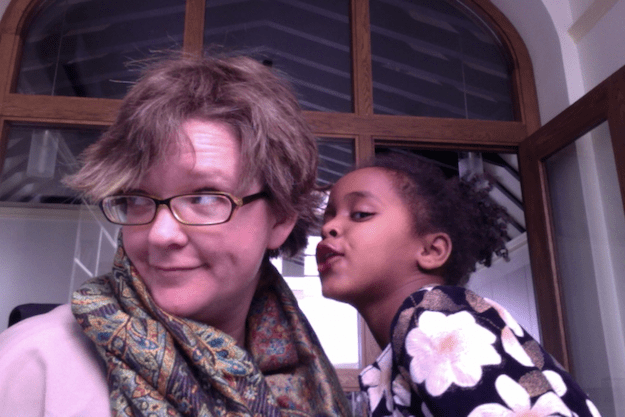 Every week I deliver a Children’s Message during the worship hour at our church. The children march to the front of the sanctuary where I try my best to impart a bit of wisdom and Word in less than five minutes. It is my second favorite five minutes of the week – second only to my first cup of coffee on Monday morning. The kids are hilarious. I use props. And I slip in some of my biggest questions because kids know stuff and they are very good at clarifying things.
Every week I deliver a Children’s Message during the worship hour at our church. The children march to the front of the sanctuary where I try my best to impart a bit of wisdom and Word in less than five minutes. It is my second favorite five minutes of the week – second only to my first cup of coffee on Monday morning. The kids are hilarious. I use props. And I slip in some of my biggest questions because kids know stuff and they are very good at clarifying things.
Why can’t we see God?
Why doesn’t God answer my prayers?
How do we know God is really out there?
If you’re not sure, ask a kid. Even if the answer is silly, it will reveal what you really think about the question.
So last week, I used our annual warm clothing drive to introduce the idea of missional family giving. I asked parents to join with their children in buying clothes to donate to the cause of cold people on the streets of New York City. Parents and kids have to work together on something like this because kids need to learn a lifestyle of giving, parents need to provide the cash, and every family needs to be shaken out of selfishness every three weeks or so. (Three days? Three months? Depends upon your family. Sometimes we talk about selfishness every three hours.)
In the middle of my rousing inspirational motivational speech about families working together to provide warm clothing for people in need, my four-year-old daughter hollered out, “I don’t have to do that because you’re my mom!”
I don’t have to do that because you’re my mom.
I stifled my instinctual DO-NOT-INTERRUPT-MOM glare that I save for Sunday mornings with my two poor preacher’s kids, and instead laughed.
At first I thought my daughter was trying to say that she did not have to be a part of the project. I didn’t think about it again for several days. Then I went back and recalled what I had been saying just before she made her declaration.
“Kids, tell your parents…kids, ask your parents…kids…” I had been encouraging the kids to get their parents on board with the project. There was no theological reasoning behind this strategy. I just know that when my kids remind me about things, I am more likely to remember to do them. And secondly, I wanted to send the subliminal message to parents that they should contribute to the campaign.
But my lovely pre-K daughter revealed something else about my pitch. She wasn’t trying to get out of the mission. She was expressing full confidence that I was already on board. I did not have to be persuaded. “I don’t have to do THAT (persuade my parents) because you’re my mom.”
I had convinced her that I was the captain of this project for our family. I was demonstrating missional leadership and I didn’t even know it.
When I was a teenager, church culture was training us to believe that adults had lost their passion. Their mission in life. It was up to us to do all the evangelizing, all of the social justice, all of the See-You-at-the-Pole-ing because those lukewarm adults were useless except as chaperones.
The future of Christianity was in our hands.
This pressure did a fair amount of damage to my own heart, but the good news is that youth ministries are turning back toward a family model of ministry. We are realizing that putting our young people on the front lines to do the hard work of evangelism is not only dysfunctional, but ineffective for both the faith of the teenagers and the people they encounter.
When fourteen-year-olds are pushed onto the street to perform a skit or hand out tracts, they know that something is not real. Adults don’t start up conversations with agendas to convert strangers. Adults don’t spend 6 days in foreign countries, putting up half a wall of a house and taking pictures of international children. Adults teach kids to do those things. Why? It’s like the classic cereal commercial where Mikey will eat the Life cereal. Do we think street preaching works? No. But the youth group will do it!
The truth is that we need the whole, complete ministry of families. Children and youth cut through the nonsense and reveal the basics of love and generosity because they do not get distracted by minutiae. And they believe in a way that we do not. But they cannot and should not ever be the foundation for our missional calling. The foundation of our calling is our mutual call to missions. Every person is called. Let every person be missional.
Next time your 7th grader gets fired up about environmental justice, make a difference together. Join a clean streets team. Collect some money for rainforest research. Stop using so many paper towels.
Next time your six-year-old wonders about the woman begging on the corner, shaking a cup of change, go visit a soup kitchen and talk about food.
Next time your child wonders about the faith of a friend, invite that friend over for a meal and playdate.
Next time your high school sophomore goes on a short term mission trip, make a family commitment to that place.
Engage in lasting change.
Don’t forget.













